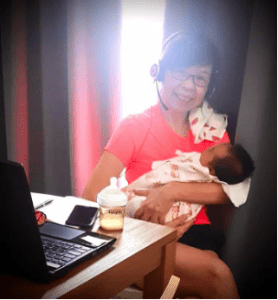Usa SKULKEREWATHANA
NUS Business School
A new grandmother, Usa talks about how her personal roles in maintaining work-life balance have had an impact on her perspectives on her academic identity.

Reflecting on the different roles I play, I wonder whether my academic identity has been strengthened or weakened during the recent Circuit Breaker (CB). Did playing multiple roles put my academic identity under threat, as posited by Clegg (2008)? Or has it just been more diversified (Ylijoki & Ursin, 2013)?
In addition to being a wife, a mother of two grown-ups, a teaching faculty and a Resident Advisor, I delightfully welcomed the news of being a grandmother-to-be in April 2020. All these roles were planned. My husband and I planned to marry and have two children. As a family of four, we planned our NUS residential life, and our daughter likewise planned to marry and build her family. Subsequently, I planned to relinquish my role as Resident Advisor after many eventful and meaningful years upon our grandchild’s arrival. That was my promise to our dearest daughter.
There were no regrets to this decision even though it meant I would miss the chance to enrich the residential lives of many students as well as to witness their personal growth and learning beyond a classroom setting. As a Resident Advisor, I was always thrilled to see the smiles on our residents’ faces when they enjoyed the events we organised. I also got cold sweats when I had to handle crises and my heart melted whenever I received greeting texts from ex-residents. I dearly treasure these priceless years and experiences.
While I have relinquished one role, I have since taken on another. When CB measures were announced in Singapore on April 3, 2020 (Baker, 2020), many questions came to my mind. Foremost in my thoughts were: would I be able to balance my multiple roles and do them well during the pandemic?
I share three key lessons from this chapter of my life—not quite academic but crucial in contributing to an effective academic role:
1. Following routines diligently—whether for work hours, exercise, sleep, etc.—and maintaining work-life balance.
I consider maintaining work-life balance a form of respect towards myself, and importantly, towards others. In fact, adhering to family routines has been identified by Arlinghaus and Johnston (2019) in their study as an important factor for family resilience during times of crisis, and for the development of social skills and academic success.
2. Reminding myself to play the role of a grandmother and not the mother of the grandchild.
It was also important for me to strike a balance of not taking over the mother’s responsibility but of supporting our daughter and son-in-law instead. For example, what, how and when to feed the baby is always our daughter’s call.
3. Being grateful and present at all times—gratitude is an antidote to all challenges.
I am grateful for the quality time with family and their thoughtful gestures, including the daily meals and desserts that my husband arranges for me, for little goodnight kisses from our children, and for the CB measures that have been blessings in disguise. We were delighted that our daughter and son-in-law have moved in with us during the CB. It has also been a learning process for me, as I learned to be present during our grandson’s daily feedings, to be mindful of his needs, and to enjoy his greeting smiles!
Moving forward, I aim to diligently adhere to what I have learnt, count my daily blessings, treasure these moments and share this chapter of my life beyond the classroom with my students. Our grandson is a precious gift and a bundle of joy, who is also teaching me to more deeply appreciate, rather than to question, my capacity to juggle my multiple roles (see Figure 1). I am thankful for this opportunity to reflect on my various roles, a timely reminder to accept and live with the complexity of my academic identity in a balanced way.

 |
Usa SKULKEREWATHANA is a Senior Lecturer in the Department of Management and Organization at the NUS Business School. She believes in concept application and learning beyond the classroom. Her teaching and learning interests are in human relations, people development and executive coaching. She served as a Resident Advisor for 12 years. Usa can be reached at bizus@nus.edu.sg. |
References
Arlinghaus, K. R. & Johnston, C. A. (2019). The importance of creating habits and routine. American Journal of Lifestyle Medicine, 13(2), 142–144. https://doi.org/10.1177%2F1559827618818044
Baker, J. A. (2020). Singapore’s circuit breaker and beyond: Timeline of the COVID-19 reality. CNA. Retrieved from https://www.channelnewsasia.com/news/singapore/covid-19-circuit-breaker-chronicles-charting-evolution-12779048.
Clegg, S. (2008). Academic identities under threat? British Educational Research Journal, 34(3), 329-345. https://doi.org/10.1080/01411920701532269
Ylijoki, O. H. & Ursin, J. (2013). The construction of academic identity in the changes of Finnish higher education. Journal Studies in Higher Education, 38(8), 1135-1149. https://doi.org/10.1080/03075079.2013.833036

